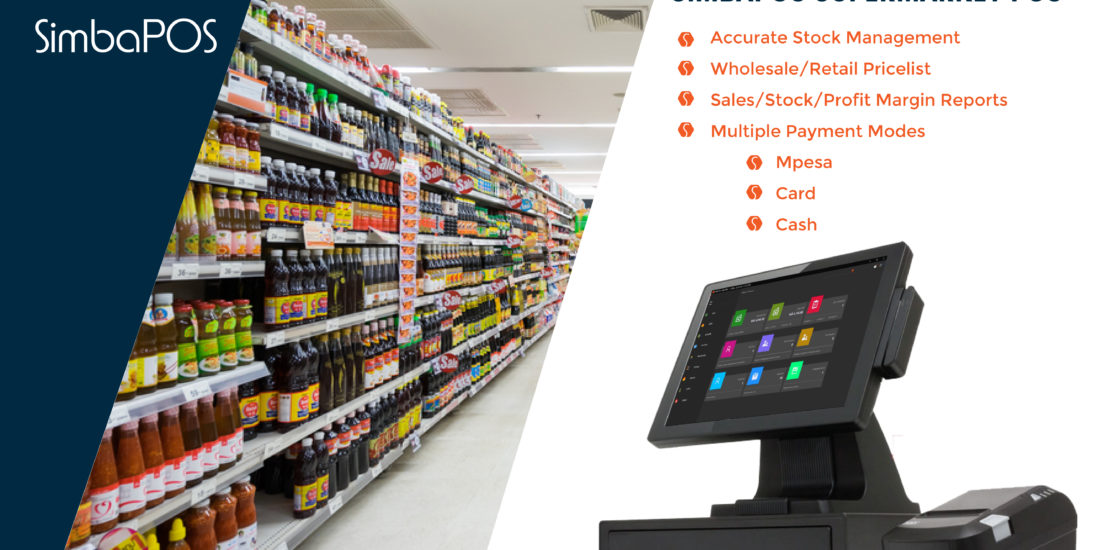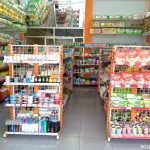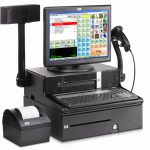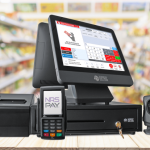- July 8, 2019
- Posted by: simba001
- Category: Uncategorized

A POS system is a valuable tool for businesspersons in any vertical market—and supermarkets/ mini-marts are certainly no exception. Without a POS System for a Supermarket in Kenya, you’ll be literally flying blind. Below are some of the direct benefits of a POS System for your Supermarket/Mini-mart.
Cash Management and Customer Checkout
In Supermarket environments, the POS System for a Supermarket in Kenya is used to ring up and record sales and financial information (the amount of money paid for each item and for customers’ orders as a whole). It also processes credit card payments, MPESA, and collects detailed data about customers (e.g., loyalty program information) and what they have purchased, down to the SKU level. A cash management component controls the cash handling process, from the POS, to the back office, to the bank, maintaining details about cash totals as well as who handled each step and when.
Whenever a customer purchases a particular item, its shop code number, how many were bought, and other critical information is automatically transmitted from the supermarket POS software to the inventory management module.
Inventory management
Supermarket shoppers demand the items they want, when they want them—and will start patronizing the competition if they can’t find the items they’re looking for on their current supermarket’s shelves. On the other hand, over-ordering leads to unnecessary expenditures—and, for perishable items, needless waste.
Any POS System for a Supermarket in Kenya with an inventory/stock management module minimizes these problems. How? Whenever a customer purchases a particular item, its shop code number, how many were bought, and other critical information is automatically transmitted from the supermarket POS software to the inventory management module. The quantity of each item purchased is automatically subtracted from the inventory count maintained in the software, giving management real-time information about what’s selling, what’s not selling, what should be ordered, and what should be carried in lesser quantities (if at all).
A supermarket POS system may even go one step further to alleviate shortages and curb over-ordering. Depending on the particular inventory management module, it may generate an alert when inventory levels reach user-defined minimums, and, in some cases, create re-orders based on this information.
Shelf space management
Maintaining an in-stock position on the items customers want is important, but so is ensuring that the right amount of shelf space is allocated to each category, and to each product within that category. An interface between POS System for a Supermarket in Kenya and a shelf space management solution allows decisions about shelf space allocation and individual product facings to be made in keeping with which items are selling faster than others. For instance, a quick look at POS data can clarify that chicken soup is more popular with customers than tomato soup, and therefore merits extra shelf space, or that one brand of tomato soup is more popular than another brand, and merits extra facings on the soup shelves.
Depending on the particular POS inventory management module, it may generate an alert when inventory levels reach user-defined minimums, and, in some cases, create re-orders based on this information.
Loss Prevention
In a supermarket—or any retail environment, for that matter—a POS system can act as a “silent partner” in reducing shrink and incidents of cash theft. With many POS systems, POS data can be cross-referenced with footage from video surveillance systems, enabling management to readily identify price-switching and employees who are either “sweethearting” (giving away items for free or at a discount), “forgetting” to ring up items (and pocketing the cash), or simply stealing from the cash drawer.
By reviewing POS data alone, supermarket owners can also pinpoint other causes of loss and shrink. Examples include honest mistakes by cashiers as items are rung up (e.g., scanning identical items in a multiple purchase once rather than twice).
Labor scheduling/time and attendance
Supermarkets’ thin profit margins make it very important to avoid guesswork when scheduling employees—whether they’re cashiers or other front-end staff members or personnel who work behind the scenes in the bakery, deli, and other departments. When a labor management module interfaces with the supermarket POS system, management can easily compare store traffic with sales patterns, and then generate or adjust schedules in accordance with historical information and real needs. This guards against under-staffing and over-staffing alike.
Meanwhile, integrating the POS system with a time and attendance solution makes it easy to enforce scheduling parameters. Employees clock in and out right on the supermarket POS terminal—so they can neither punch in and out for each other nor work beyond their scheduled hours.
When a labor management module interfaces with the supermarket POS system, management can easily compare store traffic with sales patterns, and then generate or adjust schedules in accordance with historical information and real needs. This guards against under-staffing and over-staffing alike.
Scale management
Most, if not all supermarkets sell items such as fresh produce, ready made food, coffee, and meat, all of which must be weighed before being rung up. Integrating a scale with a supermarket POS system allows for accurate ring-up of bulk transactions, as well as faster customer throughput.
It’s easy to see from the above-described applications that a POS System for a Supermarket in Kenya is the workhorse of every supermarket—and a worthwhile business investment for single- and multi-unit supermarket operators alike.





